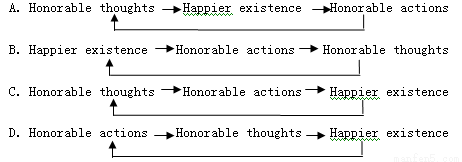题目内容
Happiness through Honorable Actions
Do you want to live with a strong sense of peacefulness, happiness, goodness, and self-respect? The collection of happiness actions broadly categorized as “honor” help you create this life of good feelings.
Here is an example to show how honorable actions create happiness.
Say a store clerk fails to charge us for an item. If we keep silent, and profit from the clerk’s mistake, we would drive home with a sense of mean excitement. Later we might tell our family or friends about our good fortune. On the other hand, if we tell the clerk about the uncharged item, the clerk would be grateful and thank us for our honesty. We would leave the store with a quiet sense of honor that we might never share with another soul.
Then, what is it to do with our sense of happiness?
In the first case, where we don’t tell the clerk, a couple of things would happen. Deep down inside we would know ourselves as a type of thief. In the process, we would lose some peace of mind and self-respect. We would also demonstrate(证明) that we cannot be trusted, since we advertise our dishonor by telling our family and friends. We damage our own reputations(名誉) by telling others. On the contrary, bringing the error to the clerk’s attention causes different things to happen. Immediately the clerk knows us to be honorable. Upon leaving the store, we feel honorable and our self-respect is increased. Whenever we take honorable action we gain the deep internal rewards of goodness and a sense of nobility.
There is a beautiful positive cycle that is created by living a life of honorable actions. Honorable thoughts lead to honorable actions. Honorable actions lead us to a happier existence. And it’s easy to think and act honorably again when we’re happy. While the positive cycle can be difficult to start, once it’s started, it’s easy to continue. Keeping on doing good deeds brings us peace of mind, which is important for our happiness.
1.According to the passage, the honorable action in the example brings us our ______.
A. self-respect B. Financial(经济的) rewards
C. advertising ability D. friendly relationship
2.The author thinks that keeping silent about the uncharged item is equal to ______.
A. lying B. stealing C. cheating D. advertising
3.The underlined phrase “bringing the error to the clerk’s attention” means ______.
A. offering advice to the clerk B. telling the truth to the clerk
C. asking the clerk to be more attentive D. reminding the clerk of the charged item
4.How does the positive cycle work according to the author?

1.A
2.B
3.B
4.C
【解析】
试题分析:文章主要讲的是可敬的行为会带给人们快乐。可敬的想法能够促使人们做出令人敬佩的行为,这样的行为能够让人们感到更加快乐。人们如果感到快乐,他们就会更容易这样想和做事情。
1.Upon leaving the store, we feel honorable and our self-respect is increased.”可知,令人尊敬的行为能够增强我们的自尊心,故选A。
2.Deep down inside we would know ourselves as a type of thief.”可知,作者认为对未收费的商品保持沉默相当于盗窃,故选B。
3.On the contrary”可知,这里说的是相反的情况,即把实情告诉店员,故选B。
4.Honorable thoughts lead to honorable actions. Honorable actions lead us to a happier existence. And it’s easy to think and act honorably again when we’re happy.”可知,可敬的想法导致可敬的行为,这样的行为会让我们变得更开心,当我们感到开心时,我们会更容易这样思考和行动,故选C。
考点:社会类短文阅读
